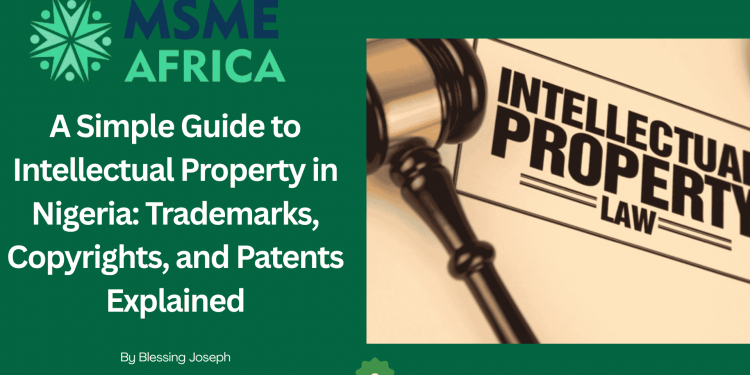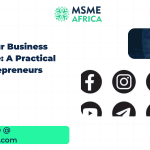Understanding intellectual property (IP) is vital for every Nigerian entrepreneur, creator, and innovator. This guide breaks down the three key types of IP protection: trademarks, copyrights, and patents, explaining what they are, how to register them, and why they matter for your business or creative work. You’ll also learn about relevant laws, agencies, and practical steps to safeguard your ideas in Nigeria.
What Is Intellectual Property?
Intellectual Property (IP) refers to creations of the mind, things like brand names, inventions, songs, books, software, and artistic designs. In Nigeria, IP rights help individuals and businesses protect their ideas from unauthorized use or copying.
The goal is simple: to encourage creativity and innovation while giving rightful owners the recognition and economic benefits of their work.
Why Intellectual Property Matters for Nigerian Entrepreneurs
For business owners and creators, protecting your intellectual property is more than a legal formality. It can:
- Increase the value of your brand or company
- Prevent others from using your name, logo, or product idea
- Help attract investors and business partners
- Allow you to earn royalties or licensing income
According to the Nigerian Copyright Commission (NCC) and the Trademarks, Patents and Designs Registry, many small business owners lose potential revenue each year because they fail to secure their intellectual property rights.
If you are building a brand, developing an app, designing clothing, or writing content, your work already qualifies for protection under IP laws. What you need to do is formalize that protection.
The Three Main Types of Intellectual Property Protection in Nigeria
1. Trademarks
A trademark is a sign that helps people distinguish the goods or services of one business from another. It could be a name, logo, slogan, color, sound, or even a shape.
Examples:
- MTN’s yellow color and logo
- Dangote’s brand name and symbol
- Innoson’s logo on its vehicles
Where to Register:
Trademarks are registered with the Trademarks, Patents and Designs Registry, under the Federal Ministry of Industry, Trade and Investment (FMITI).
Steps to Register a Trademark in Nigeria:
- Search: Conduct a trademark availability search.
- Application: File an application through an accredited agent.
- Acknowledgement: Receive an acknowledgment letter.
- Examination: The registry examines your application.
- Publication: Your trademark is published in the Trademarks Journal.
- Certificate: If no one objects within two months, you get a registration certificate.
Duration:
Trademark registration lasts for seven years initially and can be renewed every 14 years thereafter.
2. Copyrights
Copyright protects original works of authorship, including books, songs, films, computer programs, artwork, and broadcasts.
In Nigeria, copyright arises automatically when an original work is created and fixed in a tangible form (like written, recorded, or published).
Examples of Copyright-Protected Works:
- Nollywood movies
- Music and lyrics
- Software codes
- Paintings or drawings
- Academic books
Registration Body:
The Nigerian Copyright Commission (NCC) is responsible for copyright registration and enforcement.
Steps to Register a Copyright in Nigeria:
- Visit the NCC website (www.copyright.gov.ng).
- Fill out the online registration form.
- Submit a copy of the work and pay the prescribed fee.
- Receive a certificate of registration as evidence of ownership.
Duration:
- Literary, musical, and artistic works: Lifetime of the author plus 70 years.
- Films, sound recordings, and broadcasts: 50 years from the date of first publication.
3. Patents
A patent protects an invention: something new and useful that solves a technical problem. It gives the inventor exclusive rights to make, use, or sell the invention for a limited period.
Examples of Patentable Inventions:
- A new agricultural machine
- A unique chemical formula
- A software algorithm with technical functionality
Where to Register:
Patents are also registered with the Trademarks, Patents, and Designs Registry under FMITI.
Requirements for Patent Registration:
- The invention must be new.
- It must involve an inventive step.
- It must be capable of industrial application.
Steps to Register a Patent in Nigeria:
- Conduct a preliminary patent search.
- File an application through an accredited patent agent.
- Attach a full description and drawings of the invention.
- Pay the filing fees.
- Receive an acknowledgment and, after review, a certificate of registration.
Duration:
Patents last for 20 years, subject to annual renewal fees.
Intellectual Property Agencies and Laws in Nigeria
Nigeria has several laws and agencies responsible for regulating and enforcing IP rights:
Main Laws:
- Trademarks Act, Cap T13, Laws of the Federation of Nigeria 2004
- Patents and Designs Act, Cap P2, Laws of the Federation of Nigeria 2004
- Copyright Act, Cap C28, Laws of the Federation of Nigeria 2004 (as amended 2022)
Agencies Responsible:
- Trademarks, Patents, and Designs Registry (FMITI)
- Nigerian Copyright Commission (NCC)
- Standards Organisation of Nigeria (SON)
- National Office for Technology Acquisition and Promotion (NOTAP)
These agencies also collaborate with law enforcement to combat piracy, counterfeit goods, and intellectual property theft.
Common IP Mistakes Nigerian Businesses Make
- Delaying registration: Waiting until after your brand grows before protecting it.
- Assuming registration in another country covers Nigeria, IP protection is territorial.
- Failing to renew: Trademarks and patents need periodic renewal.
- Ignoring contracts: Not defining IP ownership in partnership or freelance agreements.
Tip: Read MSME Africa’s article on Protecting Your Business Identity Online to learn how digital entrepreneurs can secure their IP on the internet.
How IP Rights Support Economic Growth in Nigeria
Intellectual property encourages innovation and entrepreneurship. When creators and inventors know their work is protected, they are more likely to invest time and resources in creating new ideas.
According to the World Intellectual Property Organization (WIPO), countries that promote IP protection attract more foreign investments and stimulate local innovation. For Nigerian MSMEs, understanding IP is an essential part of building sustainable businesses.
Every Nigerian creator or entrepreneur has intellectual property worth protecting. Whether it’s your business name, app, song, or invention, registering your IP gives you control and peace of mind.
Take the time to learn the process, consult a legal professional when needed, and keep your registrations up to date. Protecting your ideas today can safeguard your business tomorrow.
Frequently Asked Questions (FAQs)
1. What is meant by intellectual property?
Intellectual property refers to creations of the mind, such as inventions, literary works, artistic works, designs, and symbols used in commerce. It gives creators exclusive rights to their work for a set period.
2. What are the 4 types of intellectual property?
The main types are trademarks, copyrights, patents, and trade secrets. These protect brand identity, creative works, inventions, and confidential business information, respectively.
3. What are the 7 intellectual property rights?
They include copyright, trademark, patent, industrial design, geographical indication, plant variety protection, and trade secret rights.
4. What is intellectual property in Nigeria?
In Nigeria, IP covers legal rights granted to protect inventions, artistic works, and brand identities. It is managed under national laws and overseen by the Trademarks, Patents and Designs Registry and the Nigerian Copyright Commission.
5. How long does a patent last in Nigeria?
A patent lasts for 20 years, provided annual renewal fees are paid.
6. How can I register my trademark in Nigeria?
You can apply through the Trademarks, Patents and Designs Registry or via an accredited agent. The process includes search, filing, examination, publication, and certification.
7. Can a foreign company register intellectual property in Nigeria?
Yes. Foreign companies can register through local representatives or accredited IP agents in Nigeria to protect their brands and inventions.
Related Reading on MSME Africa:
- How to Keep Your Business Active in Nigeria as CAC Tightens Rules
- Building a Brand That Lasts: Tips for Nigerian Entrepreneurs
MSME Africa provides news, insights, and resources that help small businesses and startups thrive across Africa.










